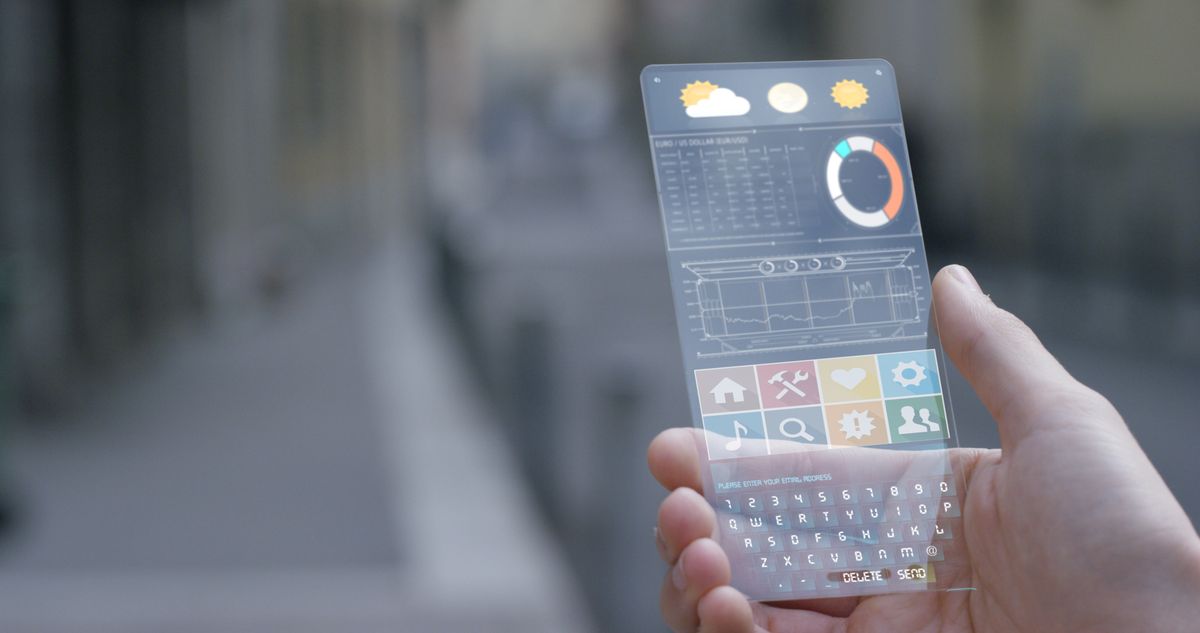Introduction: The smartphone is a symbol of human ingenuity and connectivity in the ever changing field of technology. From its modest origins as a gadget mostly used for calls and texts, it has evolved into a sophisticated instrument essential to contemporary living. However, how will smartphones appear in 2050? Let’s examine some potential forecasts and the difficulties that lay ahead.
Predictions for Smartphones in 2050:
Holographic Displays: One can envision smartphones shedding their physical screens in favor of holographic displays, projecting images and interfaces into the air. This advancement could revolutionize user experience, offering immersive interactions beyond the confines of a flat screen.
Biometric Integration: Security and personalization may reach new heights with biometric integration. Facial recognition, retinal scanning, or even DNA authentication could become standard features, ensuring unparalleled privacy and security.
AI-Powered Assistants: Artificial Intelligence (AI) assistants like Siri and Alexa may evolve into sentient companions, capable of understanding and empathizing with human emotions. These AI companions could anticipate our needs, offer personalized recommendations, and provide emotional support.
Augmented Reality (AR) Integration: Smartphones may seamlessly blend the virtual and physical worlds through augmented reality. Imagine walking down the street and receiving real-time information about nearby landmarks or businesses overlaid onto your field of vision.
Environmental Sustainability: With growing concerns about climate change, smartphones of the future may prioritize sustainability. From eco-friendly materials to energy-efficient components, manufacturers may strive to minimize their environmental footprint.
Challenges to Overcome:
Technological Barriers: Achieving such advancements requires overcoming significant technological hurdles. Holographic displays, AI companions, and seamless AR integration demand breakthroughs in materials science, computing power, and software development.
Privacy Concerns: As smartphones become more intertwined with our lives, safeguarding user privacy becomes paramount. Striking a balance between personalized services and data protection presents a formidable challenge for both tech companies and policymakers.
Ethical Dilemmas: The emergence of sentient AI companions raises ethical dilemmas surrounding their rights and responsibilities. How do we ensure AI entities respect human autonomy and ethical norms? Addressing these questions requires careful consideration and robust regulatory frameworks.
Accessibility and Inclusivity: Technological advancements should not exacerbate existing inequalities. Ensuring that futuristic smartphones remain accessible to individuals with disabilities and marginalized communities requires proactive design and inclusive development practices.
Environmental Impact: Despite efforts towards sustainability, the rapid pace of technological innovation can contribute to electronic waste and resource depletion. Mitigating the environmental impact of smartphones entails adopting circular economy principles and promoting responsible consumption habits.
In conclusion, the trajectory of smartphones in 2050 promises a future defined by innovation and connectivity. From holographic displays to sentient AI companions, the possibilities are both exhilarating and daunting. However, realizing this vision hinges on overcoming formidable challenges, from technological barriers to ethical considerations. By navigating these obstacles with foresight and collaboration, we can shape a future where smartphones empower and enrich lives while respecting privacy, ethics, and the environment.
1. Will smartphones in 2050 still have physical screens, or will they rely entirely on holographic displays?
Answer: While the exact form may vary, holographic displays are a strong contender for the future of smartphones. These displays offer the potential for immersive interactions and could replace traditional screens, providing a more dynamic user experience.
2. How will advancements in AI impact the functionality of smartphones in 2050?
Answer: AI is poised to revolutionize smartphones by enhancing personalization and intelligence. In 2050, AI-powered assistants could evolve into sentient companions capable of understanding emotions and providing tailored assistance, significantly elevating the user experience.
3. What measures will be taken to address privacy concerns as smartphones become more integrated into our lives?
Answer: Safeguarding user privacy will be a top priority for smartphone manufacturers and policymakers in 2050. Robust encryption, transparent data practices, and user-centric design will be essential to strike a balance between personalized services and data protection.
4. How will future smartphones ensure accessibility for individuals with disabilities and marginalized communities?
Answer: Future smartphone designs will prioritize accessibility and inclusivity through features such as customizable interfaces, voice commands, and tactile feedback. Proactive collaboration with accessibility experts and community feedback will drive the development of inclusive technologies.
5. What steps can be taken to mitigate the environmental impact of smartphones in 2050?
Answer: Sustainable design principles, including the use of eco-friendly materials and energy-efficient components, will be crucial in reducing the environmental footprint of smartphones. Additionally, promoting recycling programs and encouraging responsible consumption habits can help minimize electronic waste and resource depletion.


